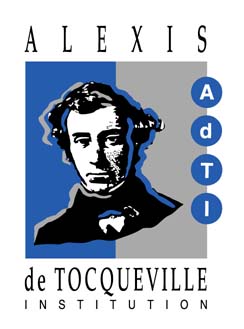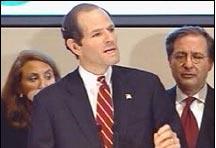
 The houses Spitzer built
The houses Spitzer built
By Gregory Fossedal
Copyright © United Press International
April 8, 2005
NEW YORK, NY -- New York Attorney General Elliot Spitzer's forthcoming appearance before a group of independent researchers and analysts, the April 13 Investorside.org conference, highlights the growth of an industry known mainly to investment professionals, but one that's beneficial to large and small investors alike. Unfortunately, it's a sector that may come under assault from regulators or in Congress again this year -- ironically, from such general advocates of free-enterprise diversity as Richard Baker (R-LA) and other Republicans.
The causes of the industry's surge are broad. Spitzer's own exposure of corruption at a number of major brokerage firms played a role -- highlighting how inherently conflicted investment banking research is, and thereby, discrediting it.
 Hero to the independents: Spitzer wasn't the only cause of the rise of independent research, which goes back to rule 28e and 1975. But his exposure of the conflicted nature of investment bank and brokerage resarch gave the independents a major boost — and thus, served the interests of investors across the board. To view Spitzer's intelligent testimony on some of the regulatory issues involved, click here. |
The culture of how such research sausages were made at the time is well captured in an insightful and readable book, Andy Kessler's classic, "Wall Street Meat." One investment banker told me candidly at the time, "we just don't see the value" in research analysts any more, given that "they don't generate commissions." It certainly tells you how some on Wall Street define "value" -- somehow leaving their investors out of the equation.
The result, since early 2002, has been an exodus of much of Wall Street's most talented researchers. Steve Parla, for example, who reportedly warned that Enron's financial statements didn't quite seem to jive with the fundamentals as an analyst at CSFB, now hangs his hat at Foresight Research Solutions.
Greatest hits
From their new positions outside the temple and away from the money-changers, Parla and his fellow diasporates now add every day to a rich history of timely, counter-consensus warnings on stocks, sectors, and currencies. Here are some of the top calls by independent researchers:
1. Johnson-Smick. G8 Central-bank analyst-guru Dave Smick ferreted numbers out of Germany's Bundesbank that suggested Italy would not be able to hold the exchange rate for the lire, and further concluded that the British pound would be the next dominoe. The result was a heads up to George Soros and other clients who profited handsomely in the collapse Smick's information presaged.
(Typically, Soros and other great investors do not wince at paying 6-figure fees, and 7-figure bonuses, to people like Smick: the information is worth 10-figure profits to them.)
2. Torpedo Alert. Economist Bruce Gulliver's sophisticated model for evaluating corporate financial filings suggested problems at Worldcomm, Enron, and others as early as 2000, and throughout 2001. Similarly, Scott Cleland’s Precursor group warned twice, in writing, on Worldcomm -- six months before and 20 days before the bankruptcy filing. David Tice's "Behind the Numbers" advised clients to sell Tyco and Lucent before their fall. Tice was one of the first analysts to start taking a hard look at accounting practices, back in the 1980s.
3. Business Cycle Developments. Bill Weissert noted in May of 2000 that his "market peak indicators" presaged a top, repeating the call later that summer. In particular, Weissert warned of the "severe over-weighting" of the tech sectors and a consequent opportunity in value stocks. Weissert projected a dollar peak against the euro at 85 in early November 2000 -- about a 50 percentage point gain as of trading this morning.
4. Lehrman Bell Mueller Cannon. In meetings with clients and memoranda from August to early December 1994, then-chairman Lewis Lehrman and others (including, full disclosure: me) warned of Mexican machinations pointing to pressures for a devaluation of the peso. A statistical analysis guided by John Mueller implied a 3-1 devaluation, the same conclusion suggested by secret research at the Treasury Department and International Monetary Fund at the time -- and almost exactly what took place in late December.
5. Medley and Associates. Richard Medley advised clients, and later the world in multiple media appearances, to take note of the strong momentum of tax-cuts and other policy reforms in Russia in 2001-2002. Combined with a rising oil price, Medley said, these should produce "perhaps the biggest bull market" in the world. They did.
Honorable mention must go to such researcher-analysts as Stu Sweet (sell Fannie Mae, 2003-2004), supply-side Godfather Jude Wanniski (buy U.S. Treasuries hand-over-fist, 1982), and economist Mueller for his late-1990s projections, based largely on demographics, of a Japan-style flattening of the Dow Jones stock index for many years to come.
The examples above are focused chiefly on trainwreck-avoidance reorts. But there are many cases of good research highlighting upside opportunities also missed by the big boys.
Soft power
If the proximate causes of the industry's recent surge include Spitzer, Oxley, Sarbanes, and the internet, then the roots of independent research's vital history go back to "rule 28e," which dates to 1975.
As a recent analysis by research veteran Roland Miller suggests, it was this rule -- part of a broader perfection of financial market deregulation that brought cost competition to Wall Street commissions -- that was the prime mover in launching what is often also called "soft-dollar research," and the fruits that have followed.
("Soft dollars," taken from brokerage commissions to pay for research outside the brokerage, have nothing in common with the more familiar political "soft money" contributions to campaigns. It would, of course, be interesting to see how such companies as Goldman Sachs, Morgan Stanley, and Vanguard directed their political "soft money" in 2002 and 2004. But Bottom Line leaves that to a creative Naderite, a staffer at the Al Franken Show.)
It might not be too strong to say that, along with the creation of electronic trading technology, the rise of independent research after 28e helped fuel one of the greatest expansions and diffusions of wealth in human history. Independent research, right next to Gordon Macklin and the men and women of the Nasdaq, was present at the creation of the great bull market of 1980-2000 and of the "ownership society" President Bush and others hope to build on today.
|
Key links, resources |
Among the other black hats, knowledgeable observers say, is Harold Bradley, senior vice president for American Century Funds. White hats, by contrast, go to such industry leaders as Melody Hobson of Arial Capital; to Spitzer, who has testified before Congress on the value of independent research; and of course to Cleland, John Mesearve, and John Eade, the co-founders of Investorside.
The black hats presented their proposed accounting changes as a pro-transparency measure. Unforuntately, a related purpose appears to be forcing their smaller competitors to account for their operations in such a way as to make some larger mutual funds look better in standardized comparisons -- as Ms. Hobson and others explained.
"What they were trying to do" in 2003, Miller comments, "would have really hurt independent research -- a bunch of people who have added tremendous value to the market." Miller adds that "it's understandable that people would want to do something about the mutual fund and other scandals. It's just that making life very difficult for the independents would hurt, not help, to provide transparency to investors."
Meantime, it fell on congressmen like Rahm Emmanuel (D-IL) and Paul Kanjorsky (D-PA) to bring in some of the white hats --and advance the case that independent research, largely paid for by soft dollars, is indeed a needed corrective to Street-analyst group-think. (Emmanuel, alas, appeared to change hats briefly some months later at a discussion of the mutual fund market timing scandals, though that issue has little connection to independent research.)
What federal regulators and even Spitzer discovered only after the fact, "Torpedo Alert" and "Precursor" predicted.
What Sarbanes-Oxley attempts to cure by hiring bureaucrats, independent research polices by unleashing the creativity of free markets and englightened self-interest.
Bottom Line
Baker and other Republicans are reportedly being urged by some of the big brokerages, including what's left of senior management at Morgan Stanley, to fiddle with independent research again in hearings and re-tweaking legislation following up on Sarbanes-Oxley and the mutual fund scandals. Even after Baker's bill, HR 2420, which passed the House, died in the Senate, he and Congressman Micheal Oxley (R-OH) wrote a letter to SEC Chairman William Donaldson urging him to achieve through regulation what they had failed to do in the Congress.
Here's hoping Congress and former investment banker Donaldson just say no to tossing a bunch of poison darts at market whistle-blowers like Gulliver, Weissert, and Sweet, merely because they are getting a lot of political "soft dollar commissions" of their own.
Republicans have much more urgent work in financial regulation, such as asking the Bush Treasury Department why it continues to tacitly support the theft of $50 billion from U.S. and European investors by Argentina -- generating vast commissions for such accomplices the Bank of New York, among others. Perhaps once they take care of that, and of more than a dozen of Chinese, Russian, and other foreign firms allowed to list as ADRs in the U.S. despite questionable financial statements, they will have time to force small operations like Arial Capital to account for their research expenditures in a way that suits Vanguard and American Century.
If the GOP keeps whistling the same regulatory tune, though, and manages to add a few Senate Democrats, then people like Spitzer, Kanjorsky, and such 2008 hopefuls as Hillary Clinton may be willing to pick up the torch. Even New Jersey Senator Jon Corzine, formerly of Goldman Sachs, reportedly questions the GOP's semi-annual effort to hogtie the independents.
"Once upon a time it was Republicans who opposed over-regulation of the information marketplace, and cared about stock-owners" a House committee staffer chortles. "Now it's us Democrats."
Gregory Fossedal is an advisor to international investors on global markets and ideopolitical risk, and a research fellow at the Alexis de Tocqueville Institution. Mr. Fossedal's opinions are entirely his own, and are not necessarily those of his clients, UPI, or AdTI. Furthermore, they are subject to change without notice. Link to the version of this article at The Washington Times here.